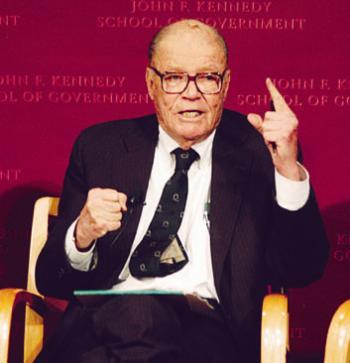
News
News Flash: Memory Shop and Anime Zakka to Open in Harvard Square

News
Harvard Researchers Develop AI-Driven Framework To Study Social Interactions, A Step Forward for Autism Research

News
Harvard Innovation Labs Announces 25 President’s Innovation Challenge Finalists

News
Graduate Student Council To Vote on Meeting Attendance Policy

News
Pop Hits and Politics: At Yardfest, Students Dance to Bedingfield and a Student Band Condemns Trump
McNamara Reflects on Career

Former Secretary of Defense Robert McNamara was a lightning rod for student anti-war sentiment while serving under President Johnson during the Vietnam War, but last night, an overflow crowd at the Kennedy School of Government received him with courteous applause.
McNamara’s visit to the John F. Kennedy Jr. Forum came just days after The Fog of War, a documentary about his life, won this year’s Oscar for Best Documentary Feature. His presentation began with his responses to six short clips from the film, on topics ranging from the Cuban missile crisis and Vietnam to weapons of mass destruction.
As in the film, McNamara was reflective and prepared to recognize the mistakes he made during his public career.
Speaking about the disputed attacks that precipitated the Tonkin Gulf Resolution, he said, “We had in our minds a mindset that that would happen—and we were wrong.”
McNamara devoted the majority of his comments to causes—including the International Criminal Court, multilateralism, nuclear disarmament and greater empathy in American foreign policy—that do not easily correspond to the decades-old image of him as a promoter of aggressive military action.
“It takes a great deal of courage. Most people do not want to recognize that they were wrong—especially at that level,” Buttenwieser University Professor Stanley Hoffmann said after the speech.
The film clips were followed by a series of questions from the audience, including two from Hoffmann. McNamara answered all the questions, though his responses contained more entertaining anecdotes than concrete solutions.
When Hoffmann asked whether it is always correct to assume that those making decisions have more information than those outside the government, McNamara said, “Recently, I’ve felt so passionate about what I’m not saying that I could explode.”
Although McNamara said he feels obliged not to comment on the actions of sitting presidents and officials who may be involved in delicate negotiations, he did express dissatisfaction with the current war in Iraq.
“We should be able to convince like-minded nations of the merit of our case, or we should reexamine our position,” he said. “We’re not omniscient.”
After a film clip containing a similar argument, McNamara said he had refused 74 interviews on the topic, but quipped, “If you think that something you’ve just heard applies—apply it!”
The comment provoked a burst of applause from the audience.
McNamara also said that whether or not weapons of mass destruction are found in Iraq, Congress has been remiss in not discussing how to reduce the risk that such weapons might be used.
“We do not have an effective approach for trying to reduce the use of weapons of mass destruction,” he said. “If we were really trying to reduce conflict, killing, and catastrophe, we’d be doing far better.”
Asked what lessons he’s learned about nuclear weapons, he said, “Get rid of them...we don’t need 7,500 ourselves. It would be possible, it should be possible, and you are the ones who can make it possible.”
After the 80-minute presentation, McNamara said he wanted to go get a drink and smiled as he accepted the applause of over 700 attendees.
—Staff writer Daniel L. Wagner can be reached at dwagner@fas.harvard.edu.
Want to keep up with breaking news? Subscribe to our email newsletter.
From Our Advertisers

Over 300+ courses at prestigious colleges and universities in the US and UK are at your disposal.

Where you should have gotten your protein since 1998.

Serve as a proctor for Harvard Summer School (HSS) students, either in the Secondary School Program (SSP), General Program (GP), or Pre-College Program.

With an increasingly competitive Law School admissions process, it's important to understand what makes an applicant stand out.

Welcome to your one-stop gifting destination for men and women—it's like your neighborhood holiday shop, but way cooler.

HUSL seeks to create and empower a community of students who are seeking pathways into the Sports Business Industry.
